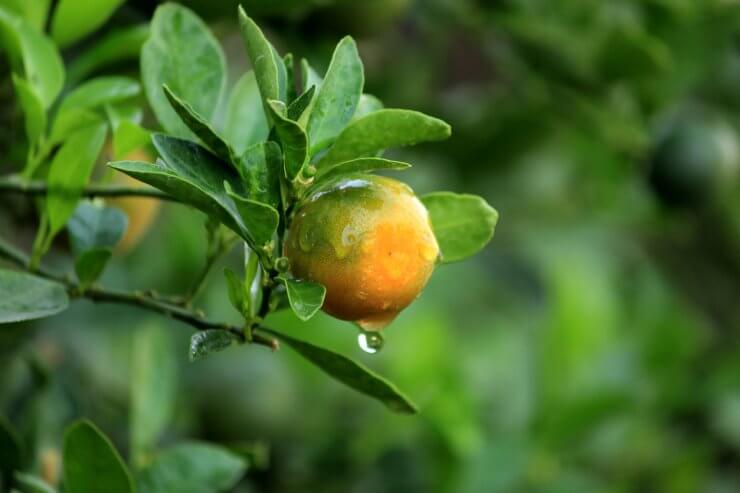
Freshly watered orange tree
Water
Once your orange trees are settled in—whether it’s in a container, a raised bed, or open ground—consistency is key when it comes to watering. If you don’t get rain on a regular basis, go out and give your orange trees a good drink of water. Oranges like soil that’s moist, but not soggy.
In general, you’ll want to water deeply about once a week. If the top of the soil is a little dry, that’s OK. But don’t let the soil dry out. This is especially important when you’re tending trees growing in containers—their roots can only reach so far in search of more water.
For trees in the ground, a long deep watering is the way to go. To ensure that the tree roots get the thorough watering they need, you can create a watering basin around the drip line of the tree—that’s the perimeter of the canopy where rain would drip off the leaves. Expand your watering basin as the drip line expands.
It’s best to water in the morning, so your tree can soak up that deep drink of water and put it to work growing oranges. Of course, if you fall behind in your watering and notice your tree is in serious need of a deep drink, don’t wait until morning. Go get the hose.
Mulch is helpful to help conserve water and deter weeds. Keep all mulch at least 6 inches away from the base of the trunk to avoid root diseases. You can lay down a 2- to 3-inch layer of wood mulch or compost to help with water retention. Light colored gravel or crushed rock can help reflect heat and help speed up the ripening of your oranges. You can also consider using “living mulch”—nitrogen-fixing clover planted between trees can provide a ready source of nitrogen for your trees while attracting pollinators.
Weeding
When it comes to weeding around your orange trees, early and often is best. If you’ve used weed-free soil and well-rotted organic matter, and laid down mulch, you shouldn’t have a big weed problem.
Properly preparing your soil is an excellent preventive measure against the emergence of weeds. When you till or cultivate the area where you’ll plant your orange tree, remove weeds and debris. You’ll likely find that the first few weeks after planting are the only time you’ll be pulling up weeds around your tree.
If weeds spring up around your orange trees during the growing season, work the soil around the base of the plants gently with a hoe—only deep enough to kill the weeds and not damage the plant’s roots.
Suckers & Thorns
Most orange trees are grafted onto rootstock. It’s important to know where that graft spot is. The fruiting wood is above; the rootstock is below. Frequently, the rootstock will send up suckers. You need to nip these in the bud, so to speak. Left unchecked, they will overtake your growing orange tree and suck the life out of it. Suckers are especially common on young trees. Be vigilant, and cut those suckers off as soon as you find them.
Fertilizer
How much and how often to fertilize your orange tree depends on the age of your tree. Get a fertilizer specially formulated for citrus trees. Be sure to follow the mixing instructions. As your tree gets older, it will require less frequent fertilization. In general, trees that are just a year old will need fertilizer every couple of months. By the time a tree is five years old or older, three feedings a year will be sufficient.
How often do you have to fertilize or water your orange trees? Do you have any particular challenges growing orange trees? Please tell us your tips for nurturing healthy orange trees.


 Previous
Previous

